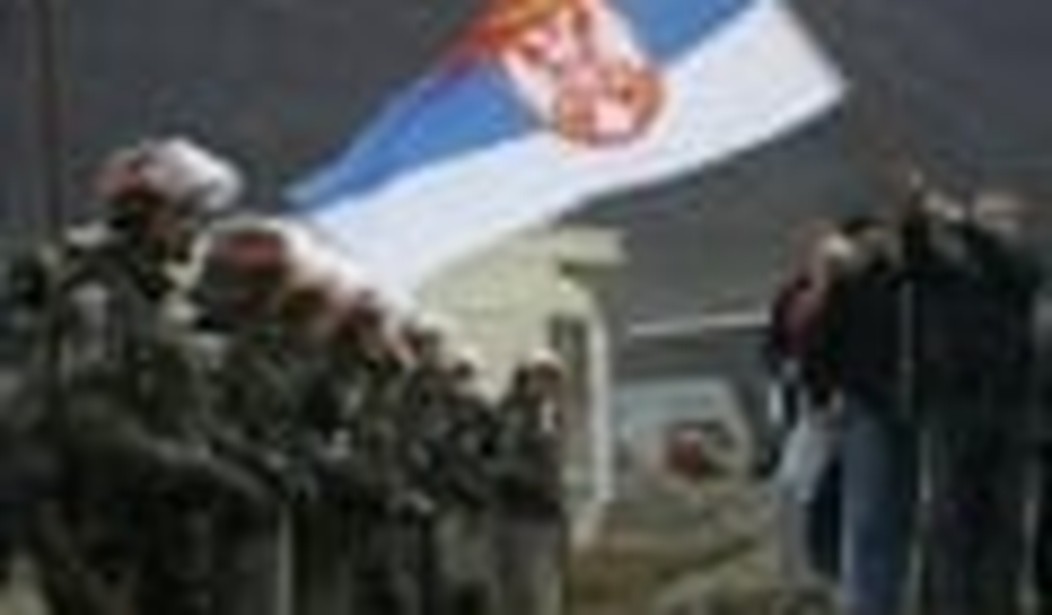In 1991, as the Balkans were disintegrating, the then-Foreign Minister of Luxembourg, Jacques Poos, proclaimed: “This is the hour of Europe. It is not the hour of the Americans.” It was (presumably) his way of saying that European governments had a responsibility to intervene in a crisis that threatened the stability of Europe.
But Europeans, paralyzed by their divisions, were unable to prevent an escalation of the conflict and Yugoslavia descended into the abyss of ethnic cleansing that cost more than 250,000 lives. It was only after the United States stepped in that a peace agreement was finally secured.
Fast-forward to 2008 and the Balkans are again confirming to the world that Europe, notwithstanding all of its superpower pretensions, remains as divided and as weak as ever. Despite several months (indeed years) of heated deliberations about the future status of Kosovo, European Union foreign ministers have not been able to agree on a common EU position. And now that the long-awaited moment of Kosovo independence has finally arrived, the EU has been able only to issue a face-saving official statement: It says it is up to individual member states to decide whether to recognize the newly self-proclaimed republic.
Although all the major countries in Europe-France, Germany, Italy and the United Kingdom-have moved quickly to recognize Kosovo as an independent country, at least seven EU member states say they will not acknowledge the new state. They worry that their own minorities could exploit the precedent that Kosovo sets.
Cyprus, for example, which is divided into the Turkish-occupied north and the Greek south, has called the bluff on the well-worn myth of European unity. Cypriot Foreign Minister Erato Kozakou-Marcoullis said: “We will never recognize the independence of Kosovo.”
Romania is also opposed to Kosovo independence; it worries that Russian separatists might press their claim on the disputed region of Transnistria in neighboring Moldova. Romanian President Traian Basescu called Kosovo’s declaration “an illegal act.” Ditto for Slovakia. It fears its ethnic Hungarian minority may secede. Slovakian Foreign Minister Jan Kubis said: “Slovakia does not see a way to recognize Kosovo.”
Greece and the Netherlands, meanwhile, are taking a wait-and-see approach. Greek Foreign Minister Dora Bakoyannis said: “Greece will take any of its decisions at a later stage.” And Dutch Foreign Minister Maxime Verhagen said: “Lets first wait for Kosovo’s Constitution. We need to examine the issue closely and ensure that human rights and the rights of the Serb minority are respected.”
The Czech Republic, for its part, says it needs more time. “The EU will be like a cycling pack. Some countries will move quickly, some will need several weeks,” said Czech European Affairs Minister Alexandr Vondra.
Few EU countries are probably more nervous about Kosovo than is Spain, which fears it could further fuel separatist passions in the Spanish regions of the Basque country, Catalonia and Galicia.
The question of separatism is already at the top of the political agenda in the March 9 general elections. The center-right opposition accuses Socialist Prime Minister José Luis Rodríguez Zapatero of having encouraged separatism through his (badly botched) attempt to negotiate with ETA, the Basque terrorist group. Indeed, Foreign Affairs minister Miguel Angel Moratinos tried to persuade Kosovo leaders to delay their independence declaration until after the Spanish elections. In any case, Zapatero has been keen not to antagonize Basque and Catalan nationalists because they are essential to his governing coalition.
Predictably, the nationalist parties in Spain have welcomed Kosovo’s declaration of independence.
In the Basque region, for example, Eusko Alkartasuna, a Basque nationalist party, said that Kosovo had exercised “its right to self-determination.” Another Basque separatist party, Aralar, said Kosovo’s declaration was a “lesson in the defense of rights” of minorities, and called on the Spanish government to “grant the Basques the right to freely and democratically decide their future.”
The Basque regional government, which plans to stage a referendum on Basque independence in October 2008, said that Kosovo’s declaration was “lesson to follow” in resolving matters of “conflicts of identity.”
In Catalonia, where a sizeable minority would like to be independent from Spain, Esquerra Republicana de Catalunya, a leftist nationalist party, said the declaration by the Kosovo parliament establishes “an important precedent.” Meanwhile, the center-right Convergència i Unió, called on Madrid to recognize Kosovo’s independence. “If the Socialist government refuses to recognize what most of the EU recognizes, that shows that it is afraid or that it does not have democracy in mind,” it said.
British Foreign Secretary David Miliband has tried to put a brave face on the divisions plaguing the EU. He declared that Europe has provided “clear leadership” on Kosovo. Slovenian Foreign Minister Dimitrij Rupel, whose country holds the EU’s rotating presidency, agrees: “The EU once again survived this test of unity,” he said, albeit somewhat unconvincingly.
The patchwork of contradictory positions on Kosovo shows (once again) that, in the real world, there is no such thing as European unity.
Soeren Kern is Senior Fellow for Transatlantic Relations at the Madrid-based Grupo de Estudios Estratégicos / Strategic Studies Group.









Join the conversation as a VIP Member